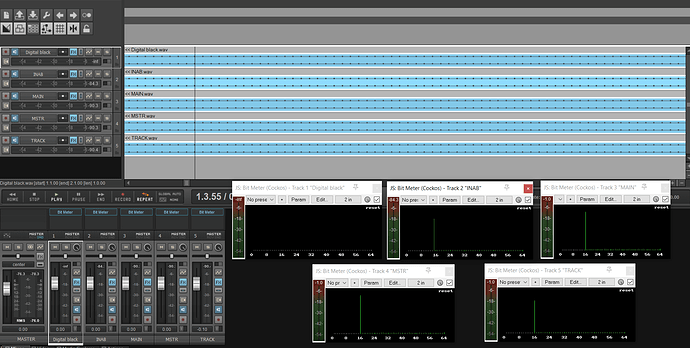Just watched it and listened critically. He did adulterate here, gain staging is all over the place. That said, the MPC60II does have an awesome sound regardless ![]()
I thought timestrech was another important factor of possible sound degradation.
yeah, this it for me. i spend time designing synths and samples, i dont want to spend additional time massaging the gear to get it back to what sounds transparent if not better to me. i want to have soundgoodizers on my desk. since i prefer to leave the level tweaking and gainstaging to software where i have infinite resolution on automation controls, the octatrack no longer has too much space in my main production rig. i dont know if i’ll ever part with it but i find it hard to justify working with it between digitakt, op1f, and ableton as the other samplers in my workspace.
I know, thats why I wrote “we” 
Sounds pretty neutral to me, and I’ve never noticed anything odd that makes it stand out as being as bad as what is being described here. I know quite a few people that swear by it, and if you want some colour or a specific sound just pass it through something to give you that. I think it’s perfect for that.
Finally did the dither test, and taking a quick look at the results there’s some interesting stuff going on here.
To test the input, I turned the gate all the way up to make sure I was (theoretically, at least) not getting any noise or artifacts from the input stage. Recorded the results with a track recorder and saved.
It looks like recordings made from the inputs ARE dithered properly, which is great!
For everything else, I rendered a file of true digital black (no audio, no dither) in Repaer, loaded it into a flex machine with timestretch off, and then played it back and recorded the track, the main output with no master track and the main output with a master track. These were all saved as three separate files. I left all of the settings except timestretch at their defualts. That means the audio from the flex machine was being attenuated a bit (since the default track level is loer than unity), which means it would be technically correct for the recordings to be dithered (as should any audio being passed to the analog outputs).
As I was typing that I realized that I completely forgot to turn the filters off, which means this isn’t a valid test in regards to whether recordings from src3 are dithered (although it looks to me like they aren’t), but it’s still interesting because if I’m interpereting what I saw correctly, the recordings of silence passed through the filter have a DC offset in the least significant bit (and the recording of the main outs with a master track, where the silence was passed through TWO filters, looks like it only has a DC offset on one channel).
This isn’t even close to thorough, and I might be missing something else obvious or being fooled by some quirk of Reaper’s waveform display or internal bitmeter (I don’t have a better one installed on the laptop and it’s not convenient to check on the desktop right now) but it’s all I have time to do right now. If someone else wants to do the internal recording test correctly, here’s the digital black I used:
Load that into a flex machine, turn timestretch off, set both effect slots to NONE (the step I forgot) and record the main output and track output to new record buffers. If the recordings are being dithered correctly, when you normalize them in a DAW the display should look something like the INAB track in the second screenshot below.
Normalized to -1dBFS:
If anyone else wants to look in to this more deeply, I’m definitely interested. Here are all the recordings I made:
EDIT: I assume the clipping in the meter on the INAB track in the normalized screenshot is showing intersample peaks, since it was normalized to -1.0 dBFS liek all the others.
Yeah, sampler A sounds good, but not at all neutral. I can get that sound by putting my samplers through the Analog Heat.
I definitely don’t think the OT sounds bad in that comparison. Certainly not “lofi” as claimed above!
What is important to remember is the age of a converter
The OT is equipped with a old converter (10years ago) and technology is quite fast in ADC/DAC world
So if you compare a sound recorded with Ableton through a modern good sound card (an apogee or UAD for example) with the same sound recorded through the OT, there will be a difference
This does not mean the OT sound bad or better, it just sounds different
OT is a great sampler it is just equipped with old technology
Elektronauts is usually a friendly place unless you say the OT has a sound I guess. Holy moly.
bold claim. octatracks a/d convertors were middle-grade when it came out, leaving it fine for most dj applications (especially those that go through the compact flash card rather than the inputs!!) but leaves a lot to be desired in the top end when “producing” and using it as a core “sampler”
i know @defenestration has done incredible things sampling with the octatrack. i know it is capable with time and patience. what i disagree with is the idea that lack of time and patience for a decade+ old machine is more a symptom of modern life than a function of “producing skill”
yes that’s right, lofi not. more like neutral, but strangely still very different from the ableton part.
I thought it was the closest to the ableton version out of the four, but my ears are old and my definition of “critical listening” is when I hear pop music and say “this sounds crap” so I’m not a good judge
I’m not that familiar with stimming and I’m probably not a fan. But I know that he is professional and makes his money from performances and productions. When you hear him talk, he also sounds very accomplished when it comes to sound. Here he addresses exactly the topic from minute 29 and I think that’s how it is. Even in the MK2 version, cheap converters were used, which in the end are rather unusable in the studio for really professional producers. That’s why most professionals tend to use it in the club, if at all.
The claim is specifically that it sounds bad (for example “dusty” and “lofi”) which is just lolwut
The circle is now complete
And don’t miss the pinned comment on that video which addresses some of his statements in the video.
I’m very sure… you can only understand that if you’ve actually had really high-quality converters. It’s hard for everyone to go crazy - that’s just how it is. They’re just crappy converters with bad luck.
He just revised it to accommodate people, but he definitely means it 
lmaooo
1000s complaints, no kidding — you alone trolled out hundreds now.
but even a million of flat earthers all stamping their tiny feet with certainty can’t flatten this huge planet Earth…
or unflatten the OT sound. its user base, the longevity, the pro users, the tests — all speak to the contrary: the SQ is flat enough and well above anyone’s personal perception and speculation.



